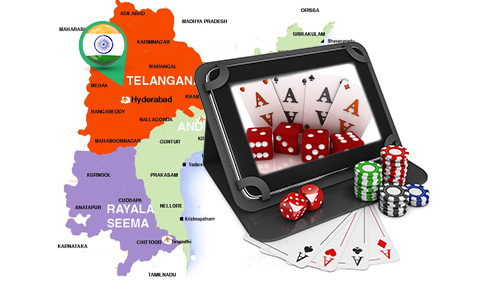Online poker and rummy may soon be classified as gambling in one of India’s states.
The government of Telangana is reportedly looking to place the two card games, which are currently considered as skill games in the country, with other forms of gambling and betting.
 According to local media outlets, the Telangana Gaming Act, 1974 may be amended with an ordinance from the state government, while a new definition of “cyber space” will also be inserted in the gaming act.
According to local media outlets, the Telangana Gaming Act, 1974 may be amended with an ordinance from the state government, while a new definition of “cyber space” will also be inserted in the gaming act.
Under the amended gaming act, playing online matka, sports betting, poker and rummy will incur criminal penalties that could range from a fine of INR5,000 (US$77) for the first offense to an imprisonment and higher fine for a second offense.
If the proposal pushes through, Telangana will be the first state in India to categorize rummy and poker within the category of gambling.
India currently permits only ‘skill’ games like rummy or poker to be conducted for stakes online. India’s Supreme Court recently announced plans to conduct a hearing into whether sports betting involves sufficient skill that it too deserves an exemption from the country’s 150-year-old gaming laws.
Mizoram gov’t accused of losing $1.8B in state lottery scam
Meanwhile, government officials in the state of Mizoram are under fire for allegedly losing about INR11,808.77 crore (US$1.83 billion)—more than the state’s budget—in a so-called lottery scam.
A report from the Comptroller and Auditor General of India (CAG) revealed “a host of anomalies in the way the Mizoram government handled the state lotteries,” which eventually resulted in the state losing close to $2 billion in revenue, Assam Tribune reported.
The state’s Income Tax Act 1961 demands that the distributors’ 10 percent commission will be deducted “as income tax at source” by the state government. The CAG, however, discovered that the Mizoram government never collected the sales proceeds, and that the distributors deposited a “minimum guaranteed revenue” to the state and kept the money.
The CAG also found that all the lottery schemes were proposed by the distributors and the state approved all of them without any alterations. This is despite the Mizoram’s Institutional Finance and State Lotteries director is supposed to deduct 30 percent from the prize above INR10,000 (US$154.74) as income tax before disbursing it to the winners.
“The State Government said proceeds from the lottery sales would be used to augment the State’s revenue for the purpose of healthcare, education, public sanitation and other sector services, but the Government had no separate Budget allocation towards the specified purposes out of revenue earned from lottery business during any year of the audited period,” the CAG said.